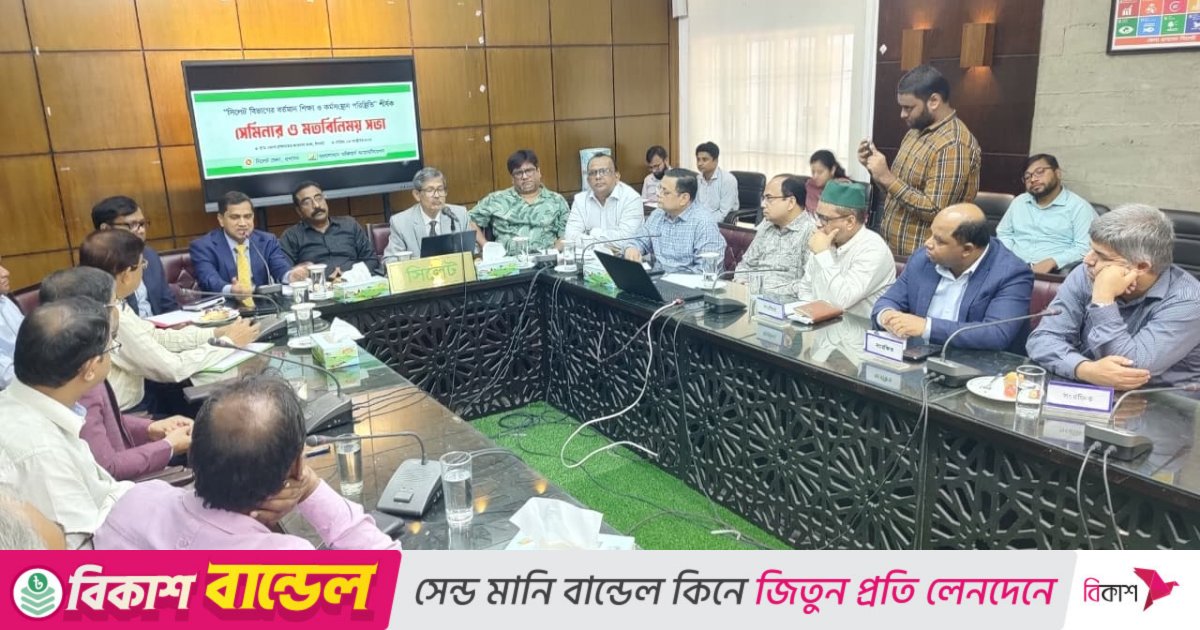Around 30% of students in the Sylhet division reportedly drop out of school, while a shortage of qualified teachers in English, science, and mathematics continues to hinder the region’s education system.
The information was presented at a seminar and views exchange meeting held in Sylhet on Saturday.
The event, jointly organized by the Jalalabad Officers’ Association, Dhaka and the Sylhet District Administration, took place at the conference room of the deputy commissioner.
It was presided over by Sylhet Deputy Commissioner Md Sarwar Alam and attended by a distinguished panel, including an ambassador hailing from Sylhet division, three secretaries, two additional secretaries, the chief of the Tax Intelligence Cell, three deputy secretaries, the divisional commissioner and deputy commissioners of Sylhet, senior education officials and other representatives from relevant departments.
In his keynote presentation, Dr Syed Masum Ahmed Chowdhury, recently retired Additional Secretary of the Power Division, said that while the average dropout rate in Sylhet division stands at 30%, the figure rises to 34.24% in Sunamganj.
Highlighting challenges in the education sector, he noted that 20% of students in the region remain inactive during floods.
There is also a shortage of skilled teachers in mathematics, science, and English—an issue reflected in this year’s HSC results. The teacher-student ratio in government schools is 1:185, while it is even lower in private institutions.
Populations in the haor and tea garden areas remain relatively poor.
The average attendance rate at the lower secondary level is 58% nationally, but only 54% in Sylhet. The region’s educational institutions also suffer from infrastructural weaknesses and inadequate administrative monitoring.
Speaking as a special guest, Bangladesh’s Ambassador to Mexico, Mushfiqur Fazal Ansari, remarked that Sylhet has lagged in development due to a lack of coordination.
He pointed out existing irregularities in airfare rates and stressed the need to overcome a prevailing sense of bureaucratic complacency in the country.
“We must work collectively for the nation’s progress,” he said, adding that the Bangladesh Embassy in Mexico has set a target to sell Bangladeshi products worth one million US dollars and expressed optimism about achieving it.
Another special guest, Abu Nasher Khan, president of the Jalalabad Officers’ Association and secretary of the Ministry of Posts and Telecommunications, said that Sylhet was once known nationwide as the educational capital of Bangladesh.
“However, the region’s intellectual leadership has gradually diminished,” he said.
To reverse this decline, he emphasized the need to enhance students’ communication and analytical skills.
He proposed the introduction of a separate English and Math Efficiency Test (EMET), as well as Qualified Bangladeshi Chef (QBC) and Qualified Bangladeshi Technician (QBT) programs tailored for Sylhet’s students.
He suggested that by 2030, one lakh youths from the region could receive international-standard vocational training, utilizing the facilities of the Sylhet Hi-Tech Park.
Other participants in the discussion included Abu Taher Md Jaber, secretary of the Ministry of Fisheries and Livestock; Abdur Rahman Torofdar, secretary of the Bangladesh Public Service Commission; Farhad Siddique, secretary (Additional Secretary) of the National Pay Commission; Khan Md Rezaun Nabi, divisional commissioner of Sylhet; Md Rezai Rafin Sarkar, chief executive officer of Sylhet City Corporation; Abdur Rakib, chief of the Tax Intelligence Department; Md Shamsul Islam, deputy secretary of the Ministry of Labour and Employment; Anwar Hossain Chowdhury, chairman of the Sylhet Education Board; Professor Dr Taj Uddin, vice-chancellor of Leading University; Dr Ziaur Rahman Chowdhury, principal of Sylhet Osmani Medical College; Professor Dr Saiful Islam of Sylhet Agricultural University; Professor Gias Uddin Ahmed, director of the Directorate of Secondary and Higher Education; Mohammad Sirajul Islam, General Secretary of Sylhet Press Club; journalist and columnist Aftab Chowdhury; Mahbub Ershad, district primary education officer; Amir Hossain, executive engineer of the Roads and Highways Department; Faruk Hossain, executive engineer of LGED; and Nurul Islam, manager of Sylhet Railway Station.
The seminar also shed light on existing challenges in Sylhet beyond education, including issues related to investment, communication, and tourism.
Participants observed that the number of educational institutions remains insufficient relative to population needs, and employment opportunities are limited.
To address these concerns, they called for diversified education programs, special initiatives for tea workers and haor communities, industry establishment based on market demand, and improved infrastructure and skilled manpower development to strengthen the tourism sector.



